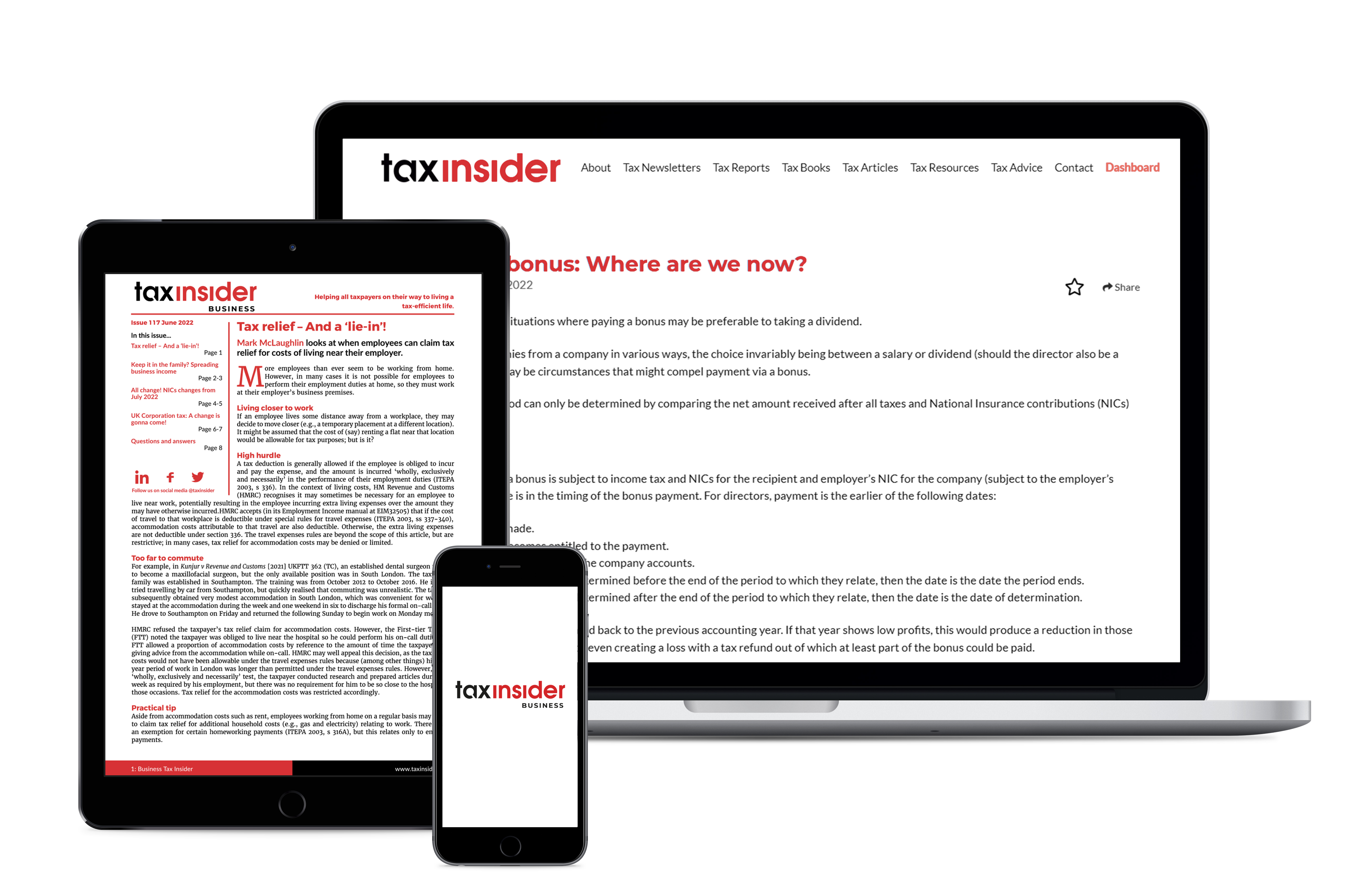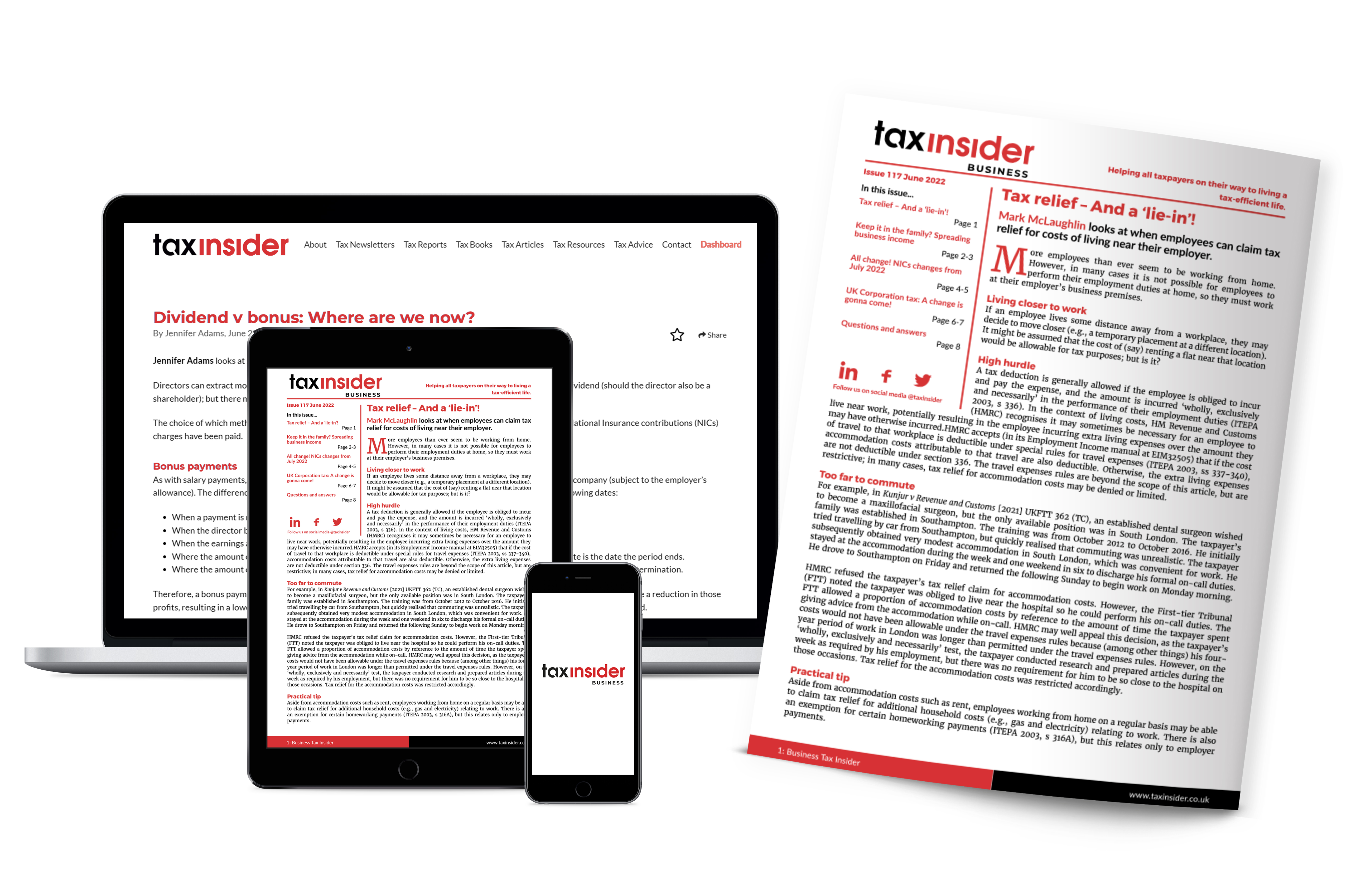Business Tax Insider subscription benefits
We recently asked our subscribers what they love about Business Tax Insider.
These are the top 7 reasons that they gave us:
-
Guaranteed ROI After 90 days, if you've not saved money on your tax bill we'll give you a prompt refund
-
Proactive We bring relevant, actionable tax saving opportunities directly to you
-
Time saving Don't waste your precious time searching for answers to tax questions on the Internet
-
Powerful Use our data, articles and information to take control of your finances
-
Safe Keep up to date, so you don't get caught out by new rules and regulations
-
Simplifying Our publications simplify complex tax rules into easily digestible, actionable points
-
Balanced We help you find a balance between saving money versus ethical & legal compliance
Here are just some of the strategies our tax experts are sharing with subscribers
-
Electric cars: Get the tax benefits before they go
The UK has legislated to make it illegal to sell a petrol or diesel car post-2030. Hybrid cars will be banned from sale from 2035, and thereafter, only electric cars will be allowed to be sold. Given that electric cars are the future, the government has introduced several grants, charging facilities and tax, fuel, and fee-saving benefits to encourage taxpayers to buy and use them. These grants and savings exist for both individuals and businesses.
Meg Saksida explains why you should take advantage of these benefits quickly before they go.
-
The 'Section 455 charge' - Exceptions and exclusions
The section 455 tax charge is a specific tax charge levied on a close company where a loan to a 'participator’ (normally a shareholder) is not cleared by the corporation tax due date falling nine months and one day after the end of the accounting period.
Sarah Bradford outlines the circumstances in which the section 455 tax charge on outstanding directors’ loans does not apply.
-
More unpaid work - Courtesy of
HMRC?Many taxpayers see themselves as unpaid workers for HM Revenue and Customs (HMRC). For example, they may be required to self-assess their own tax position, or collect and calculate PAYE deductions from the employees of the business.
Mark McLaughlin points out that there are limits to the information that taxpayers can be required to provide for HMRC.
-
Waiving goodbye to directors' loans
This article considers tax aspects of a family company making loans to a director/shareholder, and in particular where the loan is written off or “waived”. When referring to “family companies”, we mean “closely controlled”, generally by five or fewer shareholders – a typical OMB or family company setup.
Lee Sharpe looks at the potential issues of taxing loans to director/shareholders of family companies.
-
Q&As with Arthur Weller
Our Business Tax Insider articles February 2023
-
Discretionary trusts and dividends: Taxing times!
Many owner-managed companies have trusts as part of their family shareholder base. Invariably, these will be family discretionary trusts, and the main reasons for such arrangements will be family inheritance tax (IHT) planning and asset protection.
Peter Rayney examines the income tax treatment of dividend income received by the trustees of a discretionary trust.
-
Are you safe from the ‘settlements’ rules?
The ‘settlements’ rules are anti-avoidance legislation intended to prevent an individual from gaining a tax advantage from arrangements that divert income to another person who is liable to tax at a lower rate, or who is not liable to tax at all. Such an arrangement reduces the amount of tax payable on the income. The legislation only applies where the settlor has retained an interest in the settled property.
Sarah Bradford explains the National Insurance contributions savings to employers for employing certain types of employees.
-
Transferring assets to a company: Tax traps
In my previous article, I considered some tax aspects of transferring assets from OMB or family companies, primarily to director-shareholders, and the capital gains tax, VAT and payroll taxation effects.
Lee Sharpe continues his review of the tax implications of transferring assets to and from a company.
-
The ‘forgotten’ tax relief
Many businesses start out being run by sole traders or partners, who later decide to incorporate the business and operate through a limited company instead. Aside from the commercial considerations, the tax implications of incorporation are wide-ranging.
Mark McLaughlin highlights a form of income tax loss relief potentially available when an unincorporated business is transferred to a company.
-
Q&As with Arthur Weller
Our Business Tax Insider articles January 2023
-
Have recent tax changes affected spousal dividend planning?
Ever since the arrival of independent taxation in 1990, married couples (and more recently, civil partners) have been able to save useful amounts of tax by ensuring that they each use up their personal allowances and basic or lower-rate tax bands.
In most cases, tax savings can be made through the payment of dividends to the spouse. With high dividend rates set to remain for some time yet, spousal dividends are likely to provide an even greater role in minimising profit extraction costs for owner-managers.
Peter Rayney investigates whether recent tax changes have affected spousal dividend planning.
-
Transferring assets from a company: Tax traps
There are several tax issues that may arise when transferring assets from an owner-managed business (OMB) or family company.
The typical scenario is where a director-shareholder wants to extract a favoured asset, currently being treated as a fixed asset that has been used in a trading company.
Lee Sharpe looks at the main tax implications when shareholders and directors want to extract company assets.
-
NICs breaks for employing certain workers
To encourage employers to take on younger workers and those who have recently left the armed forces, National Insurance contributions (NICs) breaks are available for employers, which mean they will pay little or no employer’s (secondary) Class 1 NICs.
Sarah Bradford explains the National Insurance contributions savings to employers for employing certain types of employees.
-
So you think there’s a partnership?
It can sometimes be difficult to identify whether a business carried on by two or more individuals constitutes a partnership.
The legal definition of ‘partnership’ (in Partnership Act 1890, s 1) is: ‘the relationship which subsists between persons carrying on a business in common with a view to profit’.
Mark McLaughlin points out that determining whether a partnership exists is not as straightforward as some may think.
-
Q&As with Arthur Weller
OR, if you are ready to save money on your tax bill...





